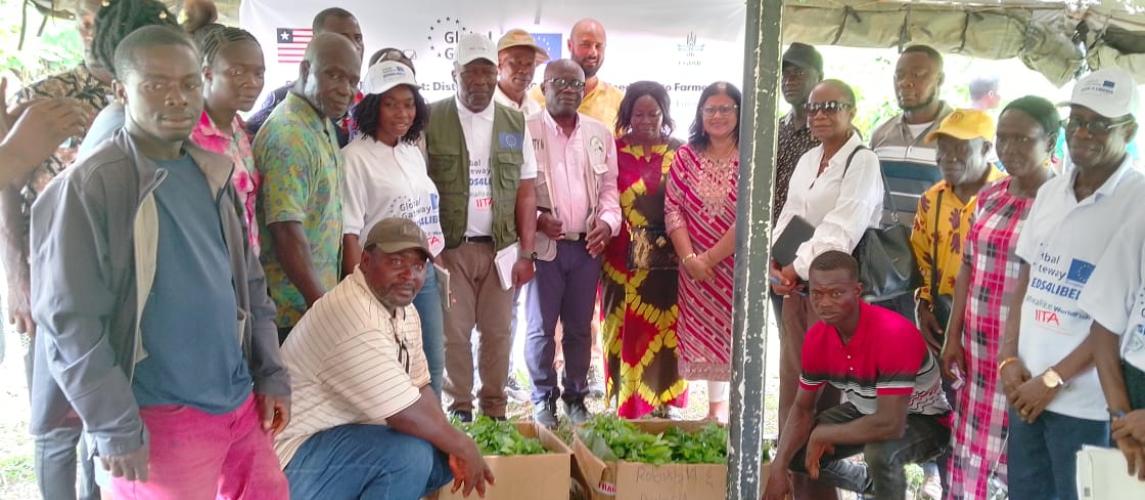
Seeds4Liberia Project at CARI Distributes 261,000 Coffee Seedlings, Empowering Liberian Farmers
By CARI Staff Writer
SUAKOKO, Bong County – Liberia’s agricultural landscape is being reimagined through the ambitious Seeds4Liberia Project. On April 15, 2025, beneath the radiant skies of Bong County, the Agricultural Research Institute of Liberia (CARI) witnessed a historic event as 261,000 coffee seedlings were distributed to farmers. This impactful initiative, led by an international–national consortium, marks a bold step toward revitalizing Liberia’s economy, enhancing food security, and promoting sustainable farming practices. Farmers representing Montserrado, Lofa, Nimba, Bong, and Margibi counties gathered under the auspices of the Farmers Union of Liberia, reflecting a unified drive for change and renewed hope.
Funded by the European Union and spearheaded by AfricaRice, the Seeds4Liberia Project is transforming Liberia’s agricultural framework. In close collaboration with CARI and key institutions—including the International Institute of Tropical Agriculture (IITA) and WorldFish—the project targets enhancements in seed production, certification, and distribution across diverse value chains such as rice, cassava, soybean, coffee, and fish. Other national partners, including the National Fisheries and Aquaculture Authority (NaFAA) and the Liberia Agricultural Commodity Regulatory Authority (LACRA), share the commitment to cultivating seeds that are resilient and fully adapted to Liberia’s unique climatic conditions. Together, these efforts aim to boost productivity, empower rural communities, and reduce dependency on imported seeds.
At the Tree Crop Unit Demonstration Site at CARI, Dr. James S. Dolo, Head of the Crop Program at CARI, explained that the distribution of coffee seedlings is only the beginning. “Today, we are initiating these seedlings at our nurseries. Once nurtured, they will be transferred to farmers’ fields,” he said. Dr. Dolo affirmed that every seedling represents a promise of sustainability, prosperity, and enhanced economic potential for farmers. He also paid tribute to IITA, a long-standing partner in advancing agricultural sustainability in Liberia since 1970, emphasizing that this enduring relationship will continue to bear fruit for generations.
Dr. Arthur Bob Karnuah, Director General, echoed these sentiments, warmly welcoming farmers from near and far and urging all partners to collaborate. “This unique opportunity requires our united effort; we must continue working together,” he stated, noting that CARI is also on track to produce an additional 10,000 coffee seedlings.
Senior Scientist Ranjana Bhhattacharjei of IITA highlighted that the project’s core objective is to improve seed quality and accessibility, thereby empowering farmers to boost productivity and, in turn, enhance livelihoods. In a similar vein, Jobson Momo, Director of the Seed Development and Certification Agency, underscored the importance of establishing resilient seed systems. He explained that such systems would not only bridge the current gap in the availability of high-quality seeds but also provide essential information on crop varieties, seed companies, and best practices for growers.
Launched in October 2024, the Seeds4Liberia Project is seamlessly aligned with Liberia’s National Agricultural Development Plan (NADP) 2024–2030, which emphasized food self-sufficiency, economic growth, and rural transformation.
Speaking on behalf of the Ministry of Agriculture, Solomon C. Hedd-Williams, Deputy Minister, Technical Services, added that by addressing critical gaps in seed production, certification, and distribution, the project aspires to reduce Liberia’s dependence on imported seeds and fortify its agricultural value chain.
Historical challenges—exacerbated by conflict and displacement—underscore the significance of this initiative, reminiscent of earlier efforts such as the World Bank–funded $7 million smallholder project of 1977–1983, the Seeds4Liberia Project stands as a beacon of progress in Liberia’s agricultural narrative. It tackles fundamental challenges in seed quality and distribution while restoring the nation’s rich agricultural legacy. With the collaborative energy of both global and local partners, the project lays a strong foundation for sustainable practices, economic empowerment, and environmental resilience. As farmers return to their communities with coffee seedlings in hand, they carry the seeds of potential that promise to rejuvenate Liberia’s coffee industry and spur national development. This initiative reaffirms the critical role of partnership in nurturing a prosperous, food-secure future for Liberia.
